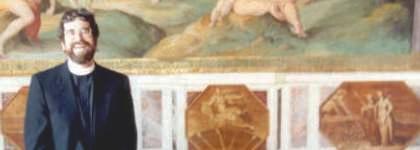
Kenya RPCV Guy Consolmagno is Curator of Meteorites at the Vatican Observatory
Interview with Brother Guy Consolmagno
Curator of Meteorites at the Vatican Observatory
by Henry Bortman
Dr. Guy Consolmagno divides his time between Tucson, Arizona, where he observes asteroids and Kuiper Belt comets with the Vatican's 1.8 meter telescope on Mt. Graham, and Castel Gandolfo, Italy, home of the Vatican meteorites. The Vatican Observatory established a research branch in Arizona in 1981 when the growing population of Rome made the sky too bright for astronomical observations.
Consolmagno is an author, Vatican astronomer and curator of the Vatican's meteorite collection. His research explores the connections between meteorites and asteroids, and the origin and evolution of small bodies in the solar system. His work in asteroid and meteorite studies prompted the International Astronomical Union to name an asteroid, 4597 Consolmagno, after him in 2000. Dr. Consolmagno earned his bachelor of science in 1974 and master of science in 1975 in Earth and Planetary Sciences from the Massachusetts Institute of Technology, and his Ph. D. in Planetary Science from the University of Arizona in 1978. From 1978-80 he was a postdoctoral fellow and lecturer at the Harvard College Observatory, and from 1980-1983 continued as postdoc and lecturer at MIT. He has also spent several terms as a visiting scientist at NASA's Goddard Space Flight Center and as a visiting professor at Loyola College, Baltimore, and Loyola University, Chicago.
Astrobiology Magazine's managing editor, Henry Bortman, had the opportunity to talk with Dr. Consolmagno at the Astrobiology Science Conference, at NASA Ames Research Center, Mountain View, California. Astrobiology Magazine (AM): I have to confess - no pun intended - that I didn't know the Vatican had a curator of meteorites. Can you describe what it is you do?
Guy Consolmagno: I do meteorite research. I'm also a planetary scientist, and I'm interested in the origin and evolution of the planets, especially the small bodies. I've worked on everything from the icy moons of Jupiter, to the origins of the moon, to observing Kuiper Belt objects.
AM: And how did you come to work for the Vatican?
GC: Long story. I'd been an astronomer for 15 years before I decided to enter the Jesuits. And I did my undergraduate work at MIT and my doctorate at Arizona.
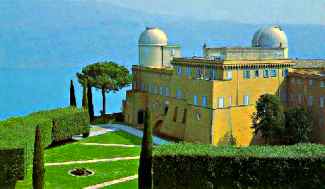
Caption: Vatican Observatory, Castel Gandolfo. The library at Castel Gandolfo contains more than 22,000 volumes and possesses a valuable collection of rare antique books including works of Copernicus, Galileo, Newton, Kepler, Brahe, Clavius, and Secchi. Credit: Arizona U./Vatican Observatory
And at one point I wondered why was I wasting my time doing astronomy when people are starving in the world - a little voice of conscience. So I joined the Peace Corps. While I was there, I discovered that I loved teaching. But mostly I discovered that the people in Africa, the people in Kenya, where I was, wanted to know about astronomy. That's what they wanted from me. And they were as fascinated and as excited about it as I was, as anyone in America.
And I understood then why it's important. It's one of those things that makes us more than just well-fed cows. It satisfies a really deep hunger to know, to go someplace, to explore. And that is a hunger that is as human, as basic to human beings as food and shelter and anything else. And it's denied to a person only at the cost of denying them their humanity. By telling poor people, "No, no, you have to go hunt for food, you can't do astronomy," you are saying that they're less than human. And that's wrong. And it's a tragedy.
AM: Do you see the study of astronomy as a spiritual pursuit?
GC: Absolutely. When I came back from the Peace Corps, I taught for four years, and enjoyed it so much I decided to teach full-time. And so I entered a teaching order, the Jesuits. What I didn't realize was that they were going to pull me out of teaching to do full-time research at the Vatican. There's a small group of about a dozen Jesuits at the Vatican. I'm one of them. We come from all over the world. We all do just full-time astronomy. But in addition, I do a lot of public talks and things like my participation in this conference.
And the reason why the Church supports astronomy --
AM: That was my next question.
GC: -- goes back to, in sense it goes back to the reform of the calendar, back in 1582. They hired an astronomer to work out how to make the calendar work right. There's also a sense that the Church, in modern times, wants to show the world that it's not afraid of science, that it supports science, that it thinks science is a wonderful thing. Not only to reassure the scientists, but also to reassure the religious people science is a good thing. Don't listen to people who say you have to choose one or the other.
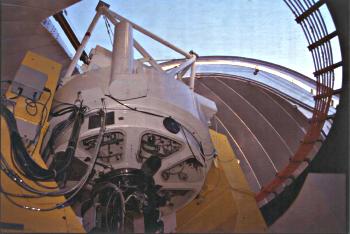
Caption: Vatican Advanced Technology Telescope (VATT) Credit: VATT/Arizona
And there's two things going on there. One is the sense that, if God made the universe, and he made it good, and he loved the universe so much that, as the Christians believe, he sent his only son, it's up to us to honor and respect and get to know the universe. I think it was Francis Bacon who said that God sets up the universe as a marvelous puzzle for us to get to know him by getting to know how he did things. By seeing how God created, we get a little sense of God's personality. And that means, among other things not going in with any preconceived notions. We can't impose our idea of how God did things. It's up to us to see how the universe actually does work.
AM: Isn't the belief that God created the universe a preconceived notion?
GC: It is. And it's a preconceived notion that in one form or another every scientist has to have. Because here's the other side: to be a scientist you have to have two fundamental assumptions, so fundamental you don't even think about it. You assume that the universe makes sense, that there really is an objective reality; there really is a logic to this; it's not just chaos; there really are laws to be found. We're so used to that assumption, you don't realize it. A lot of cultures don't have that.
And the other assumption you have to make is that it's worth doing. If your idea, if your religion is to meditate and rise above the physical universe, this corrupting physical universe, you might say, you're not going to be a scientist, you're not going to be interested in Mars. So it's a religious statement to say the physical universe is worth devoting my life to. Seeing how the universe works is worth spending a lifetime doing.
AM: Why is it a religious statement?
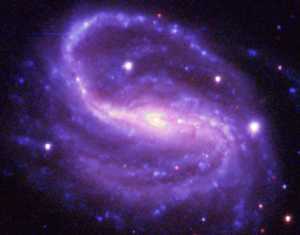
Caption: UGC12343 a real-color image of this spiral galaxy, taken as part of a large survey in the near-ultraviolet of local galaxies. Presented in November 1996 to Pope John Paul II at a conference on galaxy formation. Credit: Windhorst, et al
GC: By religious I mean that it is based on certain fundamental assumptions you have about how the universe works and what your place in the universe is. And ultimately, that's a religious assumption. Whether it's my religion or somebody else's religion, lots of people with lots of religions are looking at science. I'm not saying it's only one religion that has that assumption. But I'm saying that there are religions that don't. There are brilliant cultures throughout history who have had fabulous mathematics and glorious ethical systems - and no science. It really is an important fundamental assumption that you have to have, especially day-to-day as a scientist. It's what gets you up in the morning.
You know, one of the scary things as a scientist is that you're not punching a clock. There's probably nobody looking over your shoulder to see if you're working today. It's only after two years, when you haven't produced anything, that you don't get the next grant and then you're out of a job. But day-by-day, what gets you up, what makes you do the work? Why are you excited about this stuff? And why do you think that it's worth doing, when people are starving in the world?
AM: And what's your answer?
GC: My answer is the answer I gave before. That it's one of the things that makes us human and, for me, it's one of the things that bring me into close personal touch with God.
AM: You're at an astrobiology conference, and the goal of astrobiology is to understand the origin of life on Earth and to search for life elsewhere, including other intelligent life. So let's just go for the big prize. Suppose another intelligent species is discovered. What would that do to the Church's beliefs about God creating the universe, and Earth, and the creatures on Earth, and sending his only son - which is what it says in the book - to this planet, where there is an intelligent species, perhaps one among millions?
GC: There are five hypotheticals there. So, "I don't know," "I don't know" and "How the heck could I know?" But, I'm also a science fiction fan --
AM: Have you read "The Sparrow"?
GC: Yes, and I hated it. But that's a whole different issue. Nobody in that book had a sense of humor. Nobody in that book knew how to laugh.
But here are three scenarios. The most likely one: We find an intelligent civilization and there's no way in creation we can communicate with them because they're so alien to us. We can't talk to dolphins now. In which case, we'll never know.
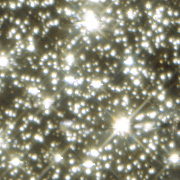
Caption: The number of stars in the visible universe is estimated to be ten times more than the number of grains of sand on Earth and eleven times the number of cups of water in all the Earth's oceans-- or 70 sextillion, or 70,000,000,000,000,000,000,000 [seven followed by twenty-two zeros]. Credit:NASA/STScI/ESA
Second scenario: We find the intelligent civilization. We can communicate. We discover that they have the two essentials that theologians talk about for the human soul, intelligence and free will. They know who they are, they're self-aware, and they're able to do something about it. I think dogs are self-aware, but they don't have a whole lot of free will. Maybe computers are the same sort of thing. Human beings have to have both.
That means if you're going to have freedom, you've got the capability of doing right and wrong. There is evil in the world, that's an observed fact. There is the need to overcome evil in the world. There's that need for salvation that we all have. I can't imagine they wouldn't need it, if they've got the same freedom we've got.
If you want to trade good bible quotes, here's one: The beginning of the Gospel of John, "In the beginning was the Word." The Word is, of course, Jesus, the Word is the second person of the Trinity, the Word is the salvation, the Word is the incarnation of God in the universe, who according to the Gospel is there before the universe was made. The one point in space-time that's the same on every timeline. So that the salvation occurs and is made manifest in the person of Jesus Christ here.
Is it possible that there are other Words in other languages to other cultures? Beats the heck out of me. But that's scenario number two. And people have talked about that for hundreds of years, the idea that there could be other lives - this is classic Catholic poetry. And that's what it is, it's poetry, it's not theology. 'Cause it's so many hypotheticals.
A third scenario: We find a dozen civilizations out there, and a bunch of Jehovah's witnesses go up and convert them all. At the end of the day, every civilization is Christian, except the human race is still not too sure about this. I mean, anything's possible.
AM: But you left one out: They convert us. Because how do we know they don't have an equally powerful set of beliefs --
GC: It's not like beliefs come with power attachments to them. We can't even convert ourselves.
AM: All right, forget "powerful." A "deeply felt" set of beliefs.
GC: Well, the only analogy we have is how different civilizations on the face of the Earth have interacted as they came in contact.
AM: The Church's record isn't so good on that one --
GC: Oh, it's a lot better than you think. It's a lot better than you think. Don't believe the anti-clerical enlightenment people who were spreading all sorts of lies to cover their own rear end. It's the Church who was protecting the indigenous people in South America, against the military.
AM: I don't think they were protecting them in California.
GC: Well, read your history. Am I saying they did everything perfectly? No. They sure did in Paraguay.
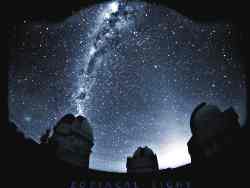
Caption: Night sky observations compete with urbanization and street lights Credit: darksky.org
The point is, if you're going to convert somebody, you have to treat them as an equal. There are people, when they came to the Americas, who thought that, well, we can enslave these people because they don't have souls. And the Church said, "You can't do that." If you're sending a missionary to somebody, you're implicitly saying they're equal.
The other thing that happens is that each side learns from the other, inevitably. And the sense of acculturation continually goes on. It went on when the missionaries from Italy showed up in Ireland. Irish sensibilities became part of the Christian milieu. German sensibilities. Russian sensibilities. Every culture has added something to the mix, and brought something out of the mix. It's inevitable. You can't pretend that it's a one-way street. Even if you wanted it to be a one-way street, it wouldn't be.
AM: Let's shift topics a bit. What is the focus of your meteorite research?
GC: My particular interest is actually the physical fabric of the meteorite. Our understanding of the origin of the solar system involves the solar nebula, condensation of a lot of, essentially, dust. And we can picture how you go from tiny grains of dust to maybe kilometer-sized balls of dust. But that's not what we see in our museums. What we see are rocks. Well-compressed, well-lithified rocks. When and where did that happen? How did that happen?
So we've gone back and measured the actual porosity of the meteorites, to look physically at the fabric of them. Individually by looking at them in thin section and with an SEM (scanning electron microscope), just point-counting where the cracks are. But also in hand sample, in bulk, using helium pycnometry and other methods to measure the densities. And one of the interesting things that came out of that is that we came up with the first really good set of meteorite densities about the time we were getting asteroid densities, and we see that they don't match at all. The asteroids are a good 20 percent less dense than the meteorites, which has fit in with new ideas that the asteroids are not big lumps of rock, they're piles of rubble, or at the very least, very fractured rocks. So this is telling us about the processes that went on four and a half billion years ago.
AM: And why does the Vatican fund this research?
GC: There's a political reason. It's a simple one, that they want the world to know that the Church isn't afraid of science, that they like science, that science is great, this is our way of seeing how God created the universe, and they want to make as strong a statement as possible that truth doesn't contradict truth, that if you have faith, then you're not going to ever be afraid of what science is going to come up with. Because it's true.
And the one time in history that they screwed up on this, the Galileo affair, the Church was wrong. And we've admitted it was wrong. How many times has science abused the Church? How often have you heard a scientist apologize to the Church?
AM: Do you think that was the only time in history that it happened?

Caption: Earth as seen by the departing Voyager spacecraft: a tiny, pale blue dot. Credit: NASA
GC: The whole scientific enterprise really does coincide well with Christian theology. The whole idea that the universe is worth studying is a Christian idea. The whole mechanism for studying the physical universe comes straight out of the whole logic of the scholastic age. Who was the first geologist? Albert the Great, who was a monk. Who was the first Chemist? Roger Bacon, who was a monk. Who was the first guy to come up with spectroscopy? Angelo Secchi, who was a priest. Who was the guy who invented genetics? Gregor Mendel, who was a monk. Who was the guy who came up with the Big Bang theory? Georges Lemaître, who was a priest. There is this long tradition; most scientists before the 19th century were clerics. Who else had the free time and the education to gather leads and measure star positions?
AM: Okay, but you brought up Galileo, I didn't. Are you saying that was a single incident, or was it a period of time --
GC: A bit of both.
AM: -- and if it was a period of time, when do you think it changed, and how and why do you think it changed? Because it took a pretty long time to apologize.
GC: Well, yes and no. You probably aren't aware of all the other apologies before the most recent apology. Nobody knows really why Galileo was gone after. You can read all the documents. They're in translation in a marvelous book by Finocchiaro, "The Galileo Affair". For most of Galileo's life he was lionized, he was treated like a hero, including by people in the Church. His book, "The Assayer", has the Church censor saying, "We're honored to live in a time with a man this wonderful." When Galileo got into trouble at the end of his life, it was a real shock. It was a complete reversal of everything that had been said up to that point.
And so the historical question is, why did it happen? And the answer is, we don't know. You can go to amazon.com and find 300 books on Galileo, every one of them with a different answer. Which is to say, there was something going on, and it wasn't simply a science versus religion thing the way that Berthold Brecht describes it in his play. If you relied on "JFK," the movie, to figure out what happened in the assassination of Kennedy, you'd be in as good shape. You've got to remember the Galileo affair occurred at the height of the Reformation and the 30 Years' War. These were really stressful times in Europe. Europe was falling apart. And it was a uniquely bad time for a lot of people in a lot of directions.
Could it happen again? Of course it could happen again. As long as there's human beings in the Church -- and the last time I saw, most of us are -- and as long as there are human beings who are scientists, there will be inevitable conflicts, there will be people who think they know better, and there will be people who will be right and people who will be wrong. The Church will always make mistakes. Scientists will always make mistakes. We're human beings.
But if you look at the whole sweep of history, for most of its history, the Church has thought that studying science is great. And there's been a fringe of religious fundamentalists - not Catholics - who have tried to warp science to their particular peculiar theology. In the same time, there have been a bunch of science fundamentalists, who have tried to use science as a substitute religion. And neither of those operations really works very well. And both of them, I think, come out of a lack of confidence.
The religious fundamentalists, basically, are scared that they don't have faith, which is why they cling so tightly to what little they've got. The science fundamentalists, I think some of them just want to be taken seriously as scientists and they think, well I have to show that I've rejected anything else.
So in that sense, science and religion are very separate. And Stephen Jay Gould had it right up to that point in his book "Rocks of Ages". But what he misses is that every human being is a person with religious beliefs, who also is a scientist. At the fundamental level -- Why do I do this? What am I looking for? Why do I choose this question instead of that question to study? What kind of picture of God do I get at the end of the day when I see that the universe is not just a dome over a flat Earth, the way that Genesis describes it, but is infinite numbers of multiverses? -- what science does is expand my view of how big God is. And as I said before, my fundamental beliefs of how the universe works, which cannot be proved by science, are the assumptions I start with before I can build a logical system. Those assumptions direct what science I do and why I do it.
AM: What do you hope to get out of being here at the Astrobiology Science Conference?
GC: Oh, having a good time. And, fundamentally, that's why we do science, because it's really enjoyable. I'm also working on a research project with Lynn Rothschild on whether or not life could be transported in the pore spaces of meteorites. And so we want to talk about that as well.
In addition, in some way, I'm waving the Church flag. Just by walking around with this badge that says "Vatican Observatory," I'm reminding people that, yes, there is indeed a religious aspect, and indeed, an ethical aspect to science. That's what the session I'm participating in here is about - that we are human beings, that we do have more than just science in our lives. And the science is great and wonderful, and when done right, is done not for money or for our own prestige or our own glory but because we want to find out what's the truth. That's the best way to do science. That's the most fun. One of the nice things about being paid by the Vatican is that I don't have to worry about NASA politics. I don't have to write grant proposals. I don't have to find out what's the flavor of the month this month. I can do anything I want.
AM: You don't have to worry about Vatican politics?
GC: Nope. They barely know we exist. My instructions when I arrived there were: do good science, period.
AM: Does the Vatican fund research other than its own research? Does it have a relationship to ESA (European Space Agency), for example?
GC: No. The Vatican's actually a pretty small outfit, per se. The budget of the Vatican is smaller than the budget of most archdioceses in the U.S., because they don't have all the schools and the hospitals and things. So the fact that we get the money we get, which is probably under a million a year, is still a substantial commitment, just to do science. But we're the only thing they can afford to do directly. There's also a pontifical academy of sciences, which are 120 great scientists from around the world, any religion, every religion, who sit as a group to advise the Vatican on issues worth worrying about. For instance, in the 80s, they were the ones who got the Pope to really speak out about nuclear winter and nuclear disarmament.
AM: Do you have any final comments to make?
GC: No. I don't expect to convert anybody here. I don't expect to convert any aliens. If I can get people to think and if I can get people to laugh, what more do I need to do?
